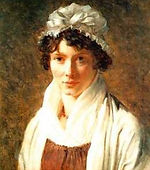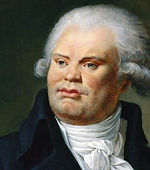
Characters

King Louis XVI, 35
Corpulent, pious Louis is not a strong king. Though he believes that he is ordained by God to rule over France, his desire to be loved by all leaves him indecisive and weak. Torn between accommodating the court nobles, who jealously want to keep their privileges, and the Third Estate (the commoners) who want a greater role in government, Louis’s actions inadvertently do more to provoke the revolution than to stop it. Louis’s power declines precipitously throughout the series until, by the end of Season 2, his head rolls.
Queen Marie Antoinette, 34
Marie Antoinette’s reputation in France had been badly stained by her early frivolous extravagances in the court. By 1789, though, she is a slightly overweight mother of three who fights to maintain the old order. Because of her sense of duty to her children, her husband and France, Marie Antoinette ignores the advice of her courtiers and stays in France during the Revolution - a fatal decision. Throughout the series, Antoinette becomes stronger and more courageous as her husband's will to fight declines. Like Louis, she spends the last few months of her life isolated in a bare and gloomy cell awaiting her execution.


Pauline Leon, 21
Pauline, the daughter of a chocolatier, is torn between her responsibilities at home, tending to her siblings and the shop, and and the exciting world of the revolutionaries. She fervently wants to contribute to the radical insurrection taking place in the streets of Paris but is constrained by one great shortcoming, her gender. Pauline and her flamboyant actress friend Claire Lacombe belie their traditional roles by taking up arms and fighting for their rights. Eventually, though, the girls get entwined in a heartbreaking love triangle that leaves one of them dead.

Maximilian Robespierre, 31
Robespierre, the “Incorruptible,” dresses as meticulously as he acts. Quiet, cold, cunning and charismatic, Robespierre becomes the crucial instigator of the radical changes in the later stages of the Revolution. He is driven by the words of his idol, philosopher Jean-Jacques Rousseau, but the more he tries to transform France into a just and rational utopia, the more blood spills on the concrete of the Place de la Revolution.

Marquis de Lafayette, 32
Lafayette, French noble and hero of the American Revolution, is eager to see some of America’s new political changes implemented in France at a moderate, conservative pace. Lafayette hosts notable Americans in Paris when they visit and acts as an intermediary between the French court and the revolutionaries without truly fitting in on either side. Starting strong, it seems as if he will be the hero of Revolution with guidance from his friend Thomas Jefferson. However, he can't tame the violent passions of the Revolutionaries.
Napoleon Bonaparte, 20
A young soldier at the time of the Revolution, Napoleon serves as a periodic narrator throughout the series. He appears briefly as a witness to the Great Fear in the French countryside then retires back to his roots as a hard-headed Corsican nationalist. When his hometown expectations are dashed, Napoleon returns to France, falls in love, and spends the rest of his life trying to prove to his indifferent wife that he is more worthy and influential than all the kings and queens of Europe.


Claire Lacombe, 24
The flamboyant Claire Lacombe has spent most of her youth dancing provocatively for rich noblemen. The Revolution has provided her with an opportunity to vent and seek vengeance against the privileged parasites who demeaned her for years. When she meets Pauline she feels unleashed. The more her new even-tempered friend tries to gain acceptance as a valued member in the core of Revolutionary elite, the more Claire recklessly causes trouble. Although they are both young, single women trying to be seen and heard in a man's world, their differences turn into deadly, petty jealousy.
Thomas Jefferson, 46
After Jefferson’s wife died, George Washington and John Adams hoped a stint as U.S. ambassador to Paris would keep him occupied and distracted. Jefferson quickly befriended Lafayette after arriving in France in 1784 and helped write the country's new constitution based on the American Declaration of Independence. Jefferson returned to the U.S. shortly after witnessing the early, hopeful, days of the French Revolution and became a staunch advocate of France from his post as Washington's Secretary of State across the Atlantic Ocean.

King Louis XVI, 35
George Danton, 40
Badly disfigured by smallpox and animal bites as a child, Danton personifies the darkness that befell France during the Reign of Terror. As head of the Committee of Public Safety (which was responsible for trying and executing tens of thousands of “counterrevolutionaries”), Danton earned a reputation for being as corrupt and self-serving as he was patriotic. But it is his tumultuous relationship with Robespierre that ultimately leads to his bloody downfall.


King Louis XVI, 35
Comte D'Artois
Louis XVI’s brother, Artois, is handsome, charming and confident and might have been an effective monarch had he been born a few years earlier. Artois is the greatest defender of the old order and tries desperately to convince the king to act decisively against the Third Estate. When the Revolution begins wreaking havoc in France, Artois flees to Savoy and then to Great Britain where he tirelessly directs a counterrevolution with the help of Britain's King George III. His grand plots to bring order and privilege back to France are hindered by his first priority - to get Louis, Antoinette and their family safely out of Paris.

King Louis XVI, 35
Marie-Therese, 11
The oldest daughter of Louis XVI and Marie-Antoinette, Marie-Therese begins the series as a typical, entitled, pre-teen. As the Revolution develops, she and her four-year-old brother become innocent victims of the changing atmosphere in France. As virtual prisoners in the Tuilleries, the children are forced to play in front of gawking crowds like monkeys in a zoo. Those days as unwilling exhibitionists, though, are halcyon compared to the young girl's true imprisonment. Alone, hungry and scared in an isolated cell, Marie-Therese vacillates between hope that her uncle will soon save the family and dread they are already dead.